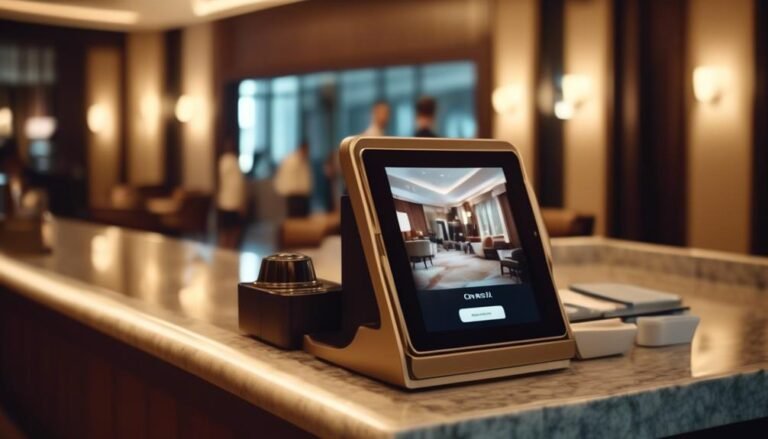Building a Career in the Evolving Hospitality Industry
As the hospitality industry continues to undergo rapid transformation, professionals seeking to build a successful career within this dynamic field are faced with both challenges and opportunities.
The evolution of consumer preferences, technological advancements, and global trends have reshaped the landscape of hospitality, creating a demand for individuals who can adapt, innovate, and lead in this ever-changing environment.
Navigating this shifting terrain requires a deep understanding of industry trends, an embrace of technological integration, and a keen insight into consumer behavior.
However, the rewards for those who can successfully navigate these changes are substantial, with the potential for both personal and professional growth.
Key Takeaways
- Sustainable practices and eco-friendly options are increasingly important in the hospitality industry.
- Integration of technology, such as mobile check-ins and data analytics, is imperative for hotels and restaurants.
- Specialized skills and expertise are in high demand, with opportunities in event management, sustainable hospitality, revenue management, and culinary tourism.
- Continuous learning and skill development are crucial for success in the ever-evolving industry.
Understanding Hospitality Industry Trends
The evolution of consumer preferences and technological advancements has significantly influenced the trajectory of the hospitality industry, shaping its current and future trends.
Two key trends that have emerged are sustainable practices and personalized experiences. Sustainable practices have become increasingly important as consumers seek eco-friendly options. This has led to a rise in environmentally conscious hotels and resorts that implement energy-saving initiatives, waste reduction programs, and sustainable sourcing of products. As the industry moves forward, there is a growing need for hospitality professionals who are knowledgeable about sustainable practices and can implement them effectively.
Additionally, the demand for personalized experiences has grown as consumers look for unique and tailored services. Technology plays a crucial role in achieving this, as hotels and other hospitality establishments utilize data-driven insights to anticipate guest preferences and deliver personalized offerings. This trend is expected to continue shaping the industry, with advancements in artificial intelligence and machine learning further enhancing the ability to cater to individual guest needs.
Understanding and adapting to these trends will be essential for professionals seeking to build successful careers in the dynamic hospitality industry.
Embracing Technology in Hospitality
Rapid advancements in technology have revolutionized the hospitality industry, reshaping the way businesses interact with and cater to their guests. The integration of technology has become imperative for hotels and restaurants to streamline operations, enhance guest experiences, and stay competitive in the digital age. From mobile check-ins and keyless room entry to personalized digital experiences, technology has significantly influenced the way hospitality services are delivered.
Technology integration in the hospitality sector has not only improved operational efficiencies but has also paved the way for enhanced guest experiences. With the use of data analytics and artificial intelligence, businesses can now personalize guest interactions, anticipate their needs, and provide tailored recommendations, thereby elevating customer satisfaction. Digital experiences, such as virtual reality hotel tours and interactive dining menus, have become essential tools for engaging guests and creating memorable experiences.
Looking ahead, embracing technology will continue to be a key driver of success in the hospitality industry. As new innovations emerge, businesses must adapt and leverage these technologies to meet evolving guest expectations and stay ahead of the competition.
Navigating Consumer Behavior Shifts
Embracing technology has fundamentally altered the landscape of the hospitality industry, necessitating a keen understanding of consumer behavior shifts to effectively meet evolving guest expectations and maintain a competitive edge. Navigating consumer behavior shifts in the digital era is crucial for professionals in the hospitality industry. Understanding and adapting to these shifts can significantly impact customer experience and the overall success of a business.
- Personalization: Tailoring experiences to individual preferences through data-driven insights enhances customer satisfaction and loyalty.
- Omni-channel Engagement: Providing seamless experiences across various digital platforms and physical touchpoints is essential in meeting the needs of tech-savvy consumers.
- Sustainability: Consumers are increasingly prioritizing sustainability and ethical practices, leading to a demand for eco-friendly initiatives and transparent supply chains.
- Health and Safety: With the heightened focus on health and safety, consumers expect stringent protocols and innovative solutions to ensure their well-being during their hospitality experiences.
As the industry continues to undergo digital transformation, professionals must remain agile and proactive in understanding and responding to these evolving consumer behavior trends to deliver exceptional customer experiences and secure long-term success.
Pursuing Specialized Hospitality Careers
As the hospitality industry continues to evolve, the demand for specialized skills and expertise is on the rise. Pursuing a specialized career path in hospitality offers professionals the opportunity to focus on niche areas such as event management, food and beverage, or sustainable tourism.
Understanding industry demand trends and seizing skill development opportunities can lead to a rewarding and impactful career in the ever-changing hospitality landscape.
Specialized Career Paths
With the increasing demand for specialized skills and expertise in the hospitality industry, pursuing specialized career paths has become an essential consideration for those seeking to thrive in this dynamic and competitive field. As the industry continues to evolve, professionals are finding new opportunities for career advancement and niche expertise. Specialized career paths offer a way to distinguish oneself in a crowded job market and cater to specific needs within the industry.
Some of the specialized career paths to consider include:
- Event Management: Planning and executing large-scale events and functions.
- Sustainable Hospitality: Focusing on environmentally friendly and sustainable practices.
- Revenue Management: Maximizing profitability through strategic pricing and inventory management.
- Culinary Tourism: Combining culinary arts with travel experiences to offer unique food-focused journeys.
Skill Development Opportunities
Seeking to excel in specialized hospitality careers necessitates a focused approach to skill development and a commitment to mastering the intricacies of one’s chosen niche. Continuous learning is crucial in the ever-evolving hospitality industry, and professionals must actively seek skill development opportunities to stay ahead.
Pursuing specialized hospitality careers requires a proactive stance towards professional growth, be it through advanced certifications, industry-specific training programs, or specialized workshops. As the industry adapts to new trends and technologies, professionals must embrace a mindset of lifelong learning to remain competitive.
This dedication to skill development not only enhances individual proficiency but also contributes to the overall advancement of the hospitality sector. Embracing ongoing learning opportunities is integral to cultivating a successful and fulfilling career in specialized hospitality roles.
Industry Demand Trends
The evolving landscape of specialized hospitality careers is marked by shifting industry demand trends, shaping the skills and expertise required for professionals to thrive in this dynamic sector. As the industry continues to evolve, it is crucial for individuals to stay abreast of these demand trends and equip themselves with the necessary skills to remain competitive in the job market.
- Employment Outlook: Keeping abreast of the current and future employment trends in the hospitality industry is crucial for making informed career decisions.
- Market Research: Understanding the latest consumer preferences and market trends is essential for businesses to stay relevant and competitive.
- Skill Requirements: Identifying the specific skills and expertise that are in high demand within the industry can help individuals tailor their career paths accordingly.
- Workforce Development: Investing in ongoing training and development programs is vital for ensuring that the workforce remains equipped to meet the evolving demands of the industry.
Adapting to Changing Guest Expectations
In the dynamic landscape of the hospitality industry, businesses must continuously evolve to meet the ever-changing expectations of their guests, ensuring a seamless and exceptional experience. Adapting to changing guest expectations requires a deep understanding of what drives guest satisfaction and loyalty. Guest experience has become a critical differentiator in the hospitality industry, and staying ahead necessitates a commitment to service innovation.
Today’s guests seek personalized, unique experiences that cater to their individual preferences. This shift has led to a greater emphasis on technology integration, allowing for more personalized interactions and streamlined service delivery. Service innovation plays a pivotal role in meeting these evolving expectations, encompassing everything from mobile check-ins and keyless room entry to customized recommendations and interactive guest experiences. Moreover, sustainability, health, and safety have become paramount concerns for guests, prompting the industry to develop innovative solutions and practices that align with these values.
In this environment, successful hospitality professionals are those who can anticipate and adapt to changing guest expectations swiftly. Embracing new technologies, understanding the shifting guest demographics, and fostering a culture of continuous improvement are imperative for meeting the dynamic demands of the modern guest.
Developing Leadership Skills in Hospitality
To excel in the dynamic and competitive hospitality industry, cultivating strong leadership skills is indispensable for driving organizational success and fostering a culture of excellence. Developing leadership skills in hospitality is crucial for navigating the ever-changing landscape of guest expectations and industry trends. Effective leadership not only ensures smooth operations but also inspires teams to deliver exceptional guest experiences.
Here are key factors to consider when developing leadership skills in the hospitality industry:
- Team Empowerment: Encouraging autonomy and decision-making capabilities among team members fosters a sense of ownership and accountability. Empowered teams are better equipped to handle guest needs promptly, leading to heightened satisfaction and loyalty.
- Effective Communication: Clear, open, and consistent communication is vital for aligning teams with organizational goals and ensuring seamless coordination across departments. Leaders who excel in communication can effectively convey expectations, provide constructive feedback, and inspire their teams to perform at their best.
- Adaptability and Resilience: The hospitality industry is prone to rapid shifts and unforeseen challenges. Leaders must demonstrate adaptability and resilience to steer their teams through uncertainties and capitalize on emerging opportunities.
- Mentorship and Development: Nurturing talent and providing opportunities for growth is essential for cultivating a skilled and motivated workforce. Effective leaders invest in mentoring their teams, recognizing individual strengths, and fostering a culture of continuous learning and improvement.
Thriving in a Competitive Hospitality Market
Navigating the complexities of a competitive hospitality market requires strategic innovation and a deep understanding of evolving consumer preferences and industry trends. In such a dynamic landscape, service excellence and personalization strategies are imperative for thriving in the industry.
Service excellence entails consistently exceeding customer expectations, delivering memorable experiences, and building strong relationships. This requires a dedicated focus on training, empowering staff, and fostering a culture of hospitality that places the customer at the center of every interaction.
Moreover, personalization strategies are increasingly crucial in the competitive hospitality market. By leveraging guest data and preferences, businesses can tailor their offerings to provide unique and customized experiences. This can range from personalized recommendations based on past behavior to creating bespoke amenities and services for individual guests. Embracing technology to gather and analyze guest data is vital in this endeavor, allowing businesses to anticipate needs and exceed expectations.
In essence, to thrive in a competitive hospitality market, organizations must prioritize service excellence and personalization strategies. By doing so, they can differentiate themselves, build loyalty, and ultimately gain a competitive edge in the industry.
Conclusion
In conclusion, the evolving hospitality industry presents both challenges and opportunities for individuals seeking to build a successful career.
By understanding industry trends, embracing technology, and adapting to changing consumer behavior, professionals can thrive in a competitive market.
Pursuing specialized careers and developing strong leadership skills will be essential for success in this dynamic field.
As the industry continues to transform, individuals must be proactive in their approach and embrace the changes to stay ahead of the curve.
The future of hospitality is bright and full of potential for those who are willing to adapt and innovate.






